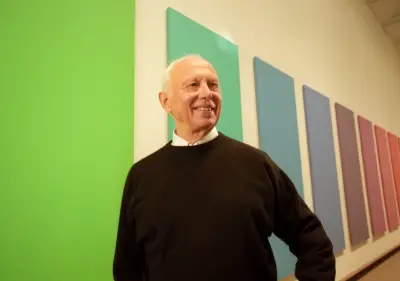|
Getting your Trinity Audio player ready...
|
A critical educational discipline, the arts break down cultural barriers, provide aesthetic appeal, communicate information, evoke emotion, and make social statements. Many organisations are committed to encouraging participation in the arts because it impacts our world in profound and meaningful ways. The Japan Arts Association understood the importance of this when they created the Praemium Imperiale.
The Praemium Imperiale is one of the most prestigious arts prizes in the world. It is a highly revered award in the global arts community, and desired by artists worldwide. They give the annual award to five artists in five disciplines who, through their work, encourage global development and enrichment.
Winning the award is a once-in-a-lifetime achievement. Those who receive this prestigious prize receive more than a medal, diploma, and monetary award—they receive international recognition that they have made a difference in the arts.
What Is the Praemium Imperiale?
The award is an esteemed arts prize. Winning the award is considered a lifetime achievement and shows dedication and commitment to making a difference in the international arts community. The Japan Arts Association betowes this annual international arts award on exceptional individuals.
The Japanese Imperial Family created the association in the late 1800s. Its original goal was to revitalise Japanese arts in the country and overseas. One of the main objectives was to encourage and embrace traditional arts.
Since its inauguration, the Japan Arts Association has surpassed its goals and contributed hugely to the international arts community. The association has held dozens of exhibitions and commemorative events.
The Praemium Imperiale didn’t come to fruition until a hundred years after the association’s inception. It was established to honour Prince Takamatsu, brother of former Emperor Shōwa. Prince Takamatsu was acclaimed for his dedication to the arts community and his philanthropic contributions throughout Japan. The Japan Arts Association’s mission aligns with Takamatsu’s desire for global unity.
Japan Arts Association Structure for Prize Awarding
To select winners for the artistic reward, the Japan Arts Association uses a very organised internal structure. There are six nominating committees, each featuring an International Advisor who serves as Chairperson. The International Advisors select potential winners for the honour across five artistic fields:
- Architecture
- Painting
- Sculpting
- Music
- Theatre/Film
When committees make their nominations, there is no consideration given to a nominee’s nationality or country of representation. The only eligibility requirements for artists are that they have accomplished noteworthy feats in the artistic discipline, or are on the path to achieving greatness within the field.
The nominating committee does not select the laureates. An anonymous group within the organisation chooses the winners from among the nominees.
Winning is one of the greatest accolades in the art world.
Notable International Advisors
Since the creation of the Praemium Imperiale, there have been many International Advisors who’ve served as Chairs. All have been well-known and renowned for their work in international affairs. Many provide enormous support and contributions to the international arts community.
Some of the most notable International Advisors include:
- David Rockefeller. Rockefeller has long been renowned for his philanthropic activities in the arts community and beyond. Throughout his lifetime, he made significant financial contributions to the Museum of Modern Art, The Rockefeller University, and Harvard University. Rockefeller was International Advisor from 1988 to 1990 and Honorary Advisor until his death in 2017.
- Caroline Kennedy. Kennedy is best known as John F. Kennedy and Jacqueline Kennedy’s daughter, though she is recognised for her work in the arts. She helped transform The Kennedy Center, the performing arts facility named after her father. Later, she served as the U.S. Ambassador to Japan and the Director of the United States-Japan Foundation. Kennedy was an International Advisor from 2018 to 2021.
- Hillary Rodham Clinton. Former First Lady and Secretary of State (United States), Hillary Clinton has always been an advocate for the arts. In 2016 when she was running for president as the Democratic nominee, she said that the arts were a major reason for urban revitalisation and expressed her desire to advance the arts. In 2022, she was an International Advisor.
Praemium Imperiale Awards Ceremony
Tokyo, Japan, was the site of the very first Praemium Imperiale awards ceremony in 1989. It has held all subsequent ceremonies in the capital city.
Each year, they announce winners of the high honour arts award in September across several major international cities, including Tokyo. They announced grants the same month via a press conference followed by a formal grant presentation.
Prize ceremonies, celebratory banquets, and all events related to the prestigious award commence in Tokyo, Japan, in November.
Praemium Imperiale Prizes
They award laureates three prizes and receive a lifetime of recognition for their work in and dedication to the arts. The distinction is considered a great honour. However, the prizes are awarded to extend gratitude for winners’ contributions to the arts in one of the five disciplines.
Winners receive a gold medal, diploma, and a financial award of 15 million yen, or roughly €103,500 (~$107,000).
Praemium Imperiale Grants
Aside from the prizes, there are awards grants. One grant per year is provided to an establishment or organisation committed to the arts and motivating youth engagement. Grants are five million yen, or roughly €34,500 (~$35,700).
The Fujisankei Communications Group sponsors all the prizes. And they contribute nearly 400 million yen annually, or around €2,900,000 (~$3,000,000).
Previous Praemium Imperiale Winners
Since the inauguration of the Praemium Imperiale, there have been over 150 laureates. Below are three previous winners in the disciplines of painting, music, and sculpture.

Elsworth Kelly. In 2000, Kelly received the renowned reward in the discipline of painting. During his tenure with the military in World War II, he developed a unique artistic language. His use of vivid colours, hard edges, geometric shapes, and abstraction made him one of the most influential artists of the twentieth century.

Daniel Barenboim. They awarded Barenboim the prestigious prize in 2007 for his work in music. He was a music director, solo pianist, chamber musician, and political activist. Among his most interesting achievements was creating the West-Eastern Divan Orchestra, which comprises young Israelis and Arabs. Barenboim founded the group to promote peace through music.

Mona Hatoum. Hatoum received the honours in 2019 for her sculpture work. After being exiled from Palestine and forced out of Lebanon after the civil war, she spent her life feeling displaced. While in London, she studied art and developed a profound artistic language. She used objects as metaphors to show social contradictions and political oppression through threatening arrangements.

Oscar Niemeyer. Niemeyer received the 2004 award in architecture. He was a renowned designer, known for his flowing concrete sculptural style. He created extraordinary buildings that blended with the natural environment, including many of the buildings in Brazil’s capital. He also designed the Niteroi Museum of Contemporary Art and the Oscar Niemeyer Museum.
This video commemorates the 2022 Praemium Imperiale music laureate, Krystian Zimerman:
Final Thoughts
The Arts’ impact on the world cannot be underestimated. The goal of the Praemium Imperiale is to recognise artists for their international contributions to the arts and the global community. By bringing awareness to international arts, the world connects and communicates in ways that are otherwise impossible.
Artists from around the world dream of winning this famous award, as it shows their dedication and devotion to the arts. It is considered a lifetime achievement, proving to the world that they made a difference through their work.

